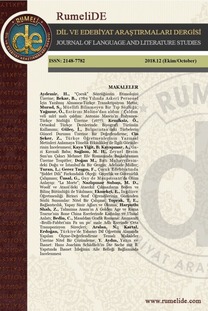Birgit Vanderbeke’nin Das Muschelessen adlı anlatısında ataerkil rol dağılımı
Bu makalenin amacı ataerkil rol dağılımı
bağlamında figürlere hangi karakteristik özellikler atfedilerek cinsiyet
kurgularının oluşturulduğunu analiz etmektir. Metin analiz sürecinde ise
Toplumsal Cinsiyet Araştırmaları esas alınmıştır. Berlin duvarının örülmesinden
kısa bir süre önce Batı Almanya’ya göç etmiş bir ailenin hikayesinin
anlatıldığı bu romanda yazarın kendi hayatının otobiyografik izlerine de
rastlanmakta, ancak yazar bu tür benzerlikleri red etmektedir. Yazar eski Doğu
Almanya’nın güç ve otoriteye dayalı ilişkileri ile ataerkil rollerinin gölgesi
altında sürdürülen bir yaşamı anlatmaktadır. Batıda başlayan yeni yaşamın
barındırdığı bireysel özgürlükler ve farklı yaşam ve çalışma ortamları aile
üyeleri için oldukça yeni şeylerdir. Batı Almanya insanın ön yargılı tutumu da
buna eklendiğinde oldukça büyük bir baskı oluşmaktadır aile üstünde. Aile her
ne kadar Doğu Almanya’nın baskıcı tutumundan kaçmış olsa da bu kez baskı ve şiddeti
uygulayan figür babadır. Ailenin kız çocuğu Ben Anlatıcı olarak aile içi
ilişkileri monolog halinde ayrıntılı bir biçimde anlatan figürdür ancak babanın
uyguladığı fiziksel şiddeti hiçbir noktada açıkça dile getirmekten kaçınır.
Babanın bu ezici ve aşağılayıcı tutumuna karşı ne anne, ne oğul ne de kız
açıkça bir direniş göstermektedir. Vanderbeke’nin kurguladığı bu “Baba” figürü
korku ve baskıyı provoke edici bir uslup ile değil, kurallar, aile içi
ritüeller, aile üyelerinden beklentiler ve örtük yasaklar aracılığı ile
yaymaktadır. Aile üyelerinin baba ile olan hesaplaşması onun evde olmadığı bir
akşamda, gıyabında gerçekleşir. Tüm aile üyeleri hayatlarında ilk kez
babalarının onları cezalandıracağına dair hep var olan o korkuyu hissetmeden
içlerini dökerler. Ve bu da aslında sadece bir gölgeden ibaret olan bu ailenin
çözülmeye uğramasının başlangıcıdır.
Anahtar Kelimeler:
Doğu Almanya, aile, rol dağılımı, şiddet, ataerkillik
The patriarchal role distribution in Birgit Vanderbeke’s narrative Das Muschelessen
This study
aims to determine the characteristic features of the figures in the context of the patriarchal roles and to analyse their gender fiction with the research methods of Gender Studies. Even though the existence of analogy in the novel with the author’s life
in East Germany interpreted, the author always rejected the autobiographic
similarities in her statements. The novel describes a family which migrated to
west Germany but they live there under the shadow of the old East Germany’s
power and recoil mechanism and patriarchal roles. Even though the family
escaped from the recoil mechanism of East Germany, now the father is the
subject that implements power and violence. The relations within family is
transferred to the reader by the girl as First Person Narrator. However, in
this narration which continues with internal monologues, the girl never states
directly that the violence that her father used. Neither mother, nor girl or
son clearly show resistance to the father. The father figure is fictionalized
by the author as a literary figure who uses fear and pressure implicitly not in
a provocative way. And he implements this with strict rules,
unchanging rituals and bans within family. In the novel, the showdown with the
father happens in a place where he is not present. The family members, who are
waiting for him to come back from a work trip, start to express themselves
clearly for the first time and therefore, the fictional family image in the
novel starts to break.
Keywords:
East Germany, family, patriarchal roles, violence, patriarchy,
___
- Primärliteratur
- Vanderbeke, Birgit (2015). Das Muschelessen, München: PIPER Verlag.
- Sekundärliteratur
- Balmes, Hans Jürgen (2002). Maggiwürfel. In: Mein erstes Buch, Frankfurt am Main: Fischer Taschenbuch Verlag. Becker-Schmidt, Regina (1996). Einheit - Zweiheit – Vielheit: Identitätslogische Implikationen in feministischen Emanzipationskonzepten. In: Zeitschrift für Frauenforschung, Heft 1 / 2, Band:14, S. 5-18, Bielefeld: Kleine Verlag. Foucault, Michel (1983). Der Wille zum Wissen. Sexualität und Wahrheit I, Berlin: Suhrkamp Taschenbuch Verlag. Foucault, Michel (2007). Die Ordnung des Diskurses. Frankfurt am Main: Fischer Taschenbuch Verlag. Hippmann, Cornelia (2012). Gleichberechtigung in der Politik? Über Karrierechancen und –schwierigkeiten ostdeutscher Frauen in der Politik. November. Gender Politik Online Sozialwissenschaftliches Gender Portal der freien Universität Berlin. ISSN 2192-5267. Online: https://www.fu-berlin.de/sites/gpo/pol_sys/partizipation/Gleichberechtigung_in_der_Politik/hippmann-Politikerinnen-Ost.pdf (Zugriffsdatum: 23.11.2018). Künzel, Christine (2005). Gewalt / Macht. In: Von Braun, Christina und Stephan, I. (Hrsg.). Gender Wissen. Ein Handuch der Gender-Theorien. Köln: Böhlau Verlag. Luhmann, Niklas (1988). Sozialsystem Familie. In: System Familie Band 1, S. 75-91. Berlin: Springer Verlag. Notz, Gisela (1990). Die Geschichte der Frauenbewegungen in Ost und Westdeutschland. In: FÜR DICH, Nr. 16. S. 35-39. Berlin: Berliner Verlag. Schmidt, Heike (2008). Ein Planspiel der SED. Frauenbilder in der DDR. In: Die Politische Meinung. Zeitschrift für Politik, Gesellschaft, Religion und Kultur. Nr. 459. Februar. S. 39-43. Online: https://www.kas.de/c/document_library/get_file?uuid=1ce31f16-aec5-5147-e2a4-45f961b41392&groupId=252038 (Zugriffsdatum:12.12.2018). Smaus, Gerlinda (1994). Physische Gewalt und die Macht des Patriarchats. In: Kriminologisches Journal. Jg. 26, Heft:4, S. 82-104.
- ISSN: 2148-7782
- Yayın Aralığı: 6
- Başlangıç: 2014
- Yayıncı: Yakup YILMAZ
